Election Details
Political System of Boys State
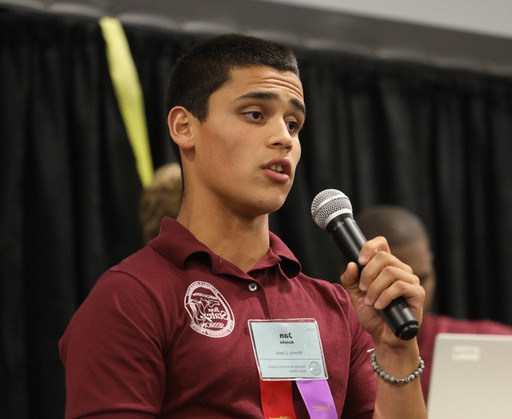
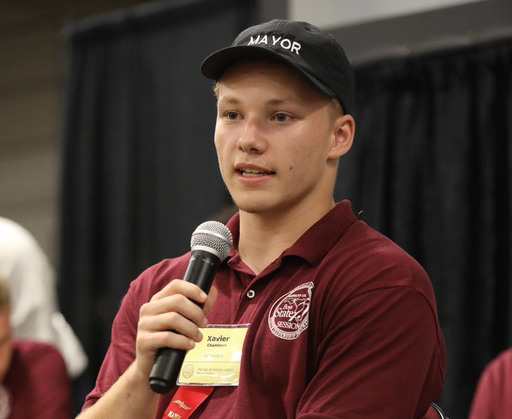
Numbers subject to change depending on attendance size for the year.
City Government
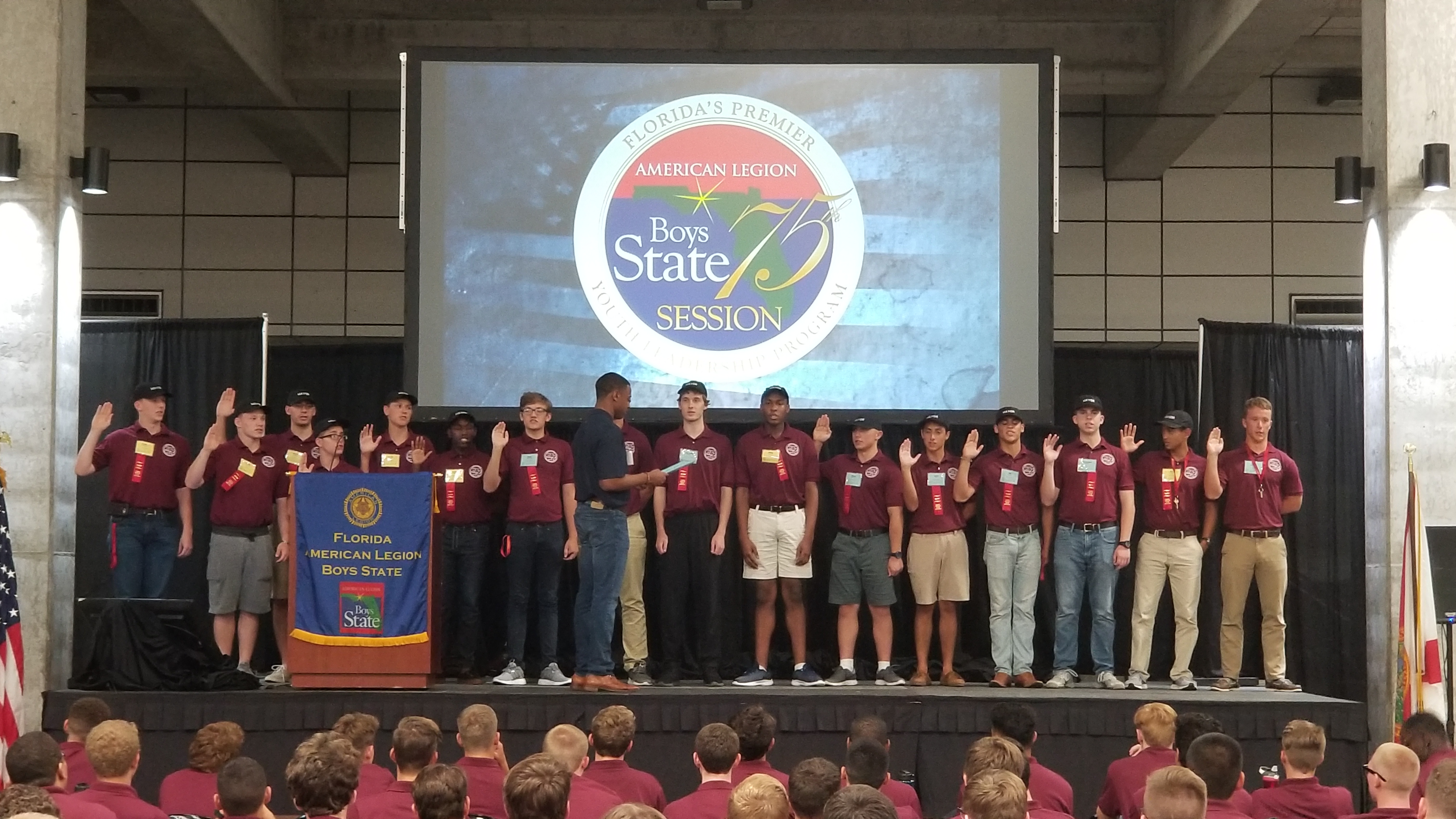
The most important city official whom the people elect is the Mayor. His duties are many and varied. He presides over meetings of the City Council. He must be alert to the needs of his city and suggest to the Council certain ordinances (city laws) which he thinks will benefit the citizens. He must be further alert to the needs of the citizens and veto any ordinances which the Council may pass which he thinks will not benefit the citizens.
He is responsible for seeing that the Chief of Police properly enforces the City ordinances, and that violators are arrested. He will follow all orders of his City Counselor and be responsible for roll call, bed check and lights-out each night.
1. Citizens who wish to run will give a time limited speech and the entire city will decide between the candidates by a majority vote.
2. Each citizen will have FOUR votes when electing City Council.
The City Council confers with the Mayor and the citizens, and passes those ordinances which it thinks are desirable. It is concerned with the business interests of its City. It is responsible for recreation, sanitation, and health. In short, the Council together with the Mayor, is always on the lookout for things that will benefit the city, and at the same time sees to it that harmful, undesirable things are prevented.
1. Citizens who wish to run will give a time limited speech and the entire city will decide between the candidates by a majority vote.
The City Clerk attends all city meetings and makes written notes of what happens. He takes care of Council correspondence and files. Through his records, the Council knows what action it has taken and is thus enabled to perform its duties in an orderly manner. The Clerk has the duty of advising any city official of any Council action affecting or of interest to such official. He advises the Chief of Police of any ordinances which are passed or repealed by the Council. He does not, however, have any voice or vote in the affairs of the Council.
The City Attorney advises the Mayor and the Council on points of law, drafts city ordinances when requested to do so, and is the parliamentarian at council meetings. Of course, he handles all legal matters affecting the city. He will serve in county court as defense attorney.
The Chief of Police is the guardian of the City and is appointed by the Mayor. In the performance of his duties, he must be capable and honest, fair and impartial, always diligent, and he must have common sense. He enforces the city ordinances, makes arrests when necessary, and keeps the peace. The Boys State Staff counts heavily on the Chief, and they work together very closely so that all ordinances, rules and regulations are properly observed. The authority of the Chief extends over anyone who may at any time come within the boundaries of his City. He assists the Mayor with bed-checks and lights-out each night at Taps.
The Fire Chief is another official who cooperates very closely with The Boys State Staff. He must be constantly alert against fire hazards. He is responsible, too, for seeing that paper, boxes, and other waste of an inflammable nature are not allowed to remain where they might start a fire. He also cooperates with the Chief of Police by reporting to that official any offenders against the "NO SMOKING" rule.
The Health & Pollution Chief is responsible for seeing to it that the City is neat, clean and orderly. In Boys State, he inspects the rooms and baths in his City. He sees to it that beds are made, bureaus and closets are neat and floors clean. The baths must be kept sanitary. Any offender in these matters is required by the Chief to put things right or be reported to the Chief of Police for his action.
County Government
Its jurisdiction extends only over the people within its boundaries. The County officials are all elected by its citizens after nomination at their county party caucuses.
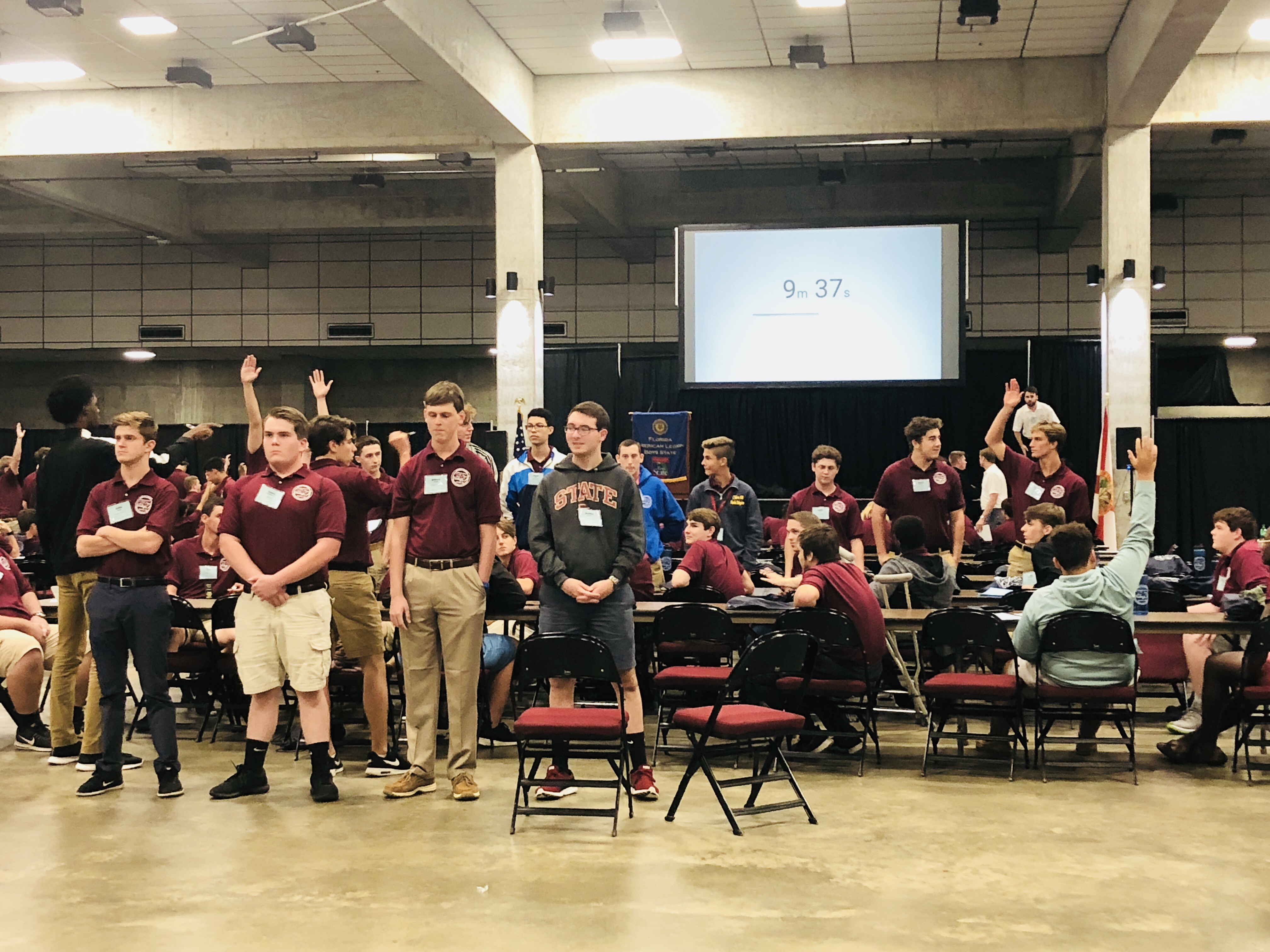
2. The entire county will decide between the TEN nominated candidates by a majority vote. Each citizen will have FIVE votes.
In Boys State, five County Commissioners are elected from each County. After their election, the Commissioners meet and choose their Chairman from among themselves. The Board generally looks out for the interests of the citizens of its County. It handles business matters and sets county ordinances for the County. The County Commissioners are to County government what the Mayor and City Council are to City government.
At Boys State, the Board of County Commissioners also serve as the Judicial Nominating Commission and evaluate, select and then submit candidates for the Supreme Court from their county for consideration by the Governor.
2. The entire county will decide between the TWO nominated candidates by a majority vote.
The County Attorney is the legal advisor of the Board of County Commissioners. He looks into county matters of a legal nature. He defends the County in court. He works with the other County Attorneys to argue cases before the Supreme Court.
The County Judge hears cases involving violations of rules and regulations passed by the Board of County Commissioners and the rules and regulations of Boys State. He tries all violations of Boys State laws considered as misdemeanors in his County only.
The Clerk of the Court has a wide range of duties. In addition to keeping his records of matters in the County court, he keeps a public record of all papers, and is Secretary to the Board of County Commissioners. He is Auditor of the county, seeing to it that the County money is properly spent.
The Sheriff keeps the peace of the County, enforces both County rules and regulations and those of Boys State. He also manages the County jail. The Sheriff will appoint two deputies, one from each city, to help him.
At Boys State, the Board of County Commissioners also serve as the Judicial Nominating Commission and evaluate, select and then submit candidates for the Supreme Court from their county for consideration by the Governor.
LEGISLATIVE BRANCH
The Legislator who would serve his people well must observe the citizen's requirements, and then, with full courage, go about making, changing, or repealing laws so as to accomplish the desired ends.
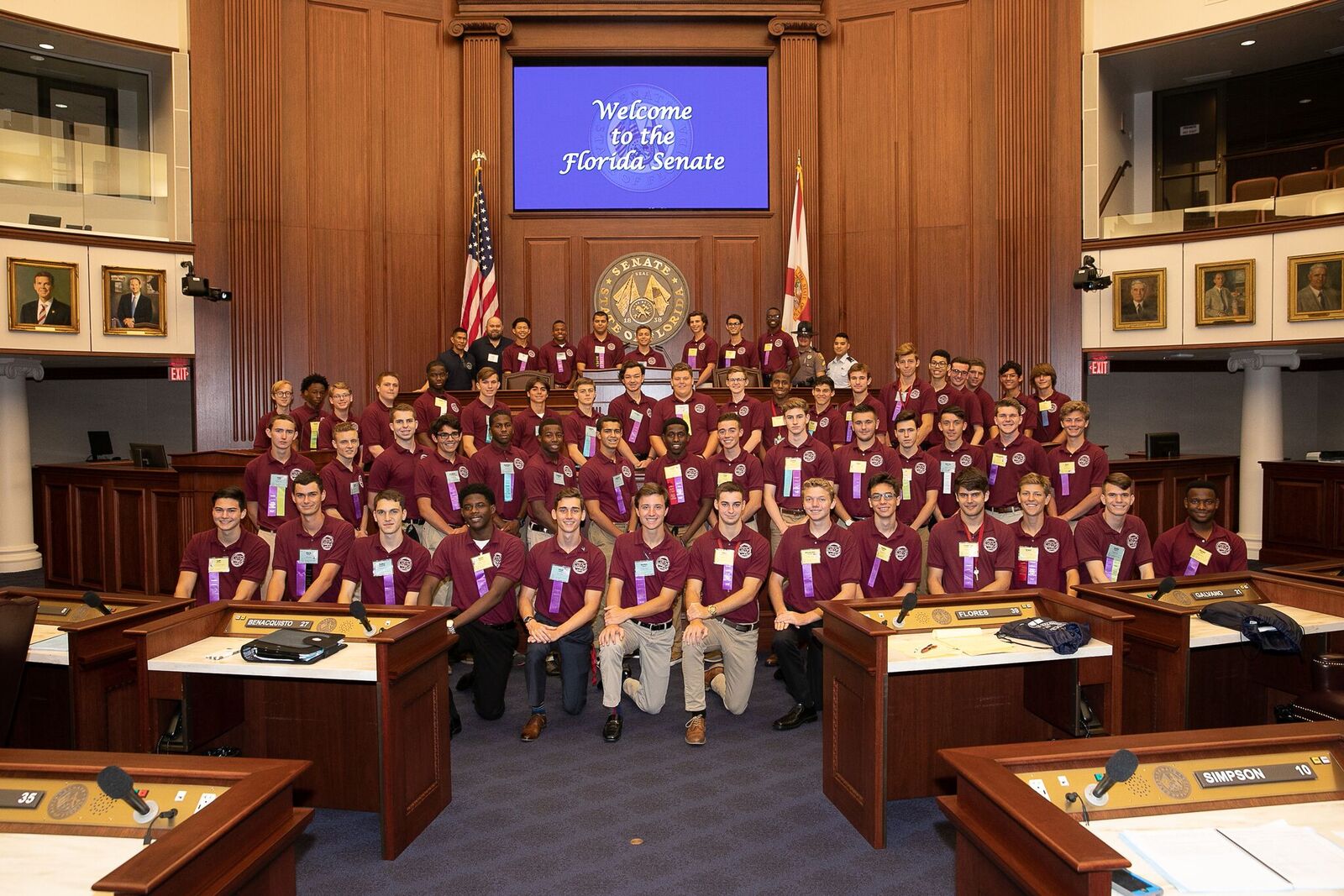
2. The entire city will decide between the nominated candidates for the House.
Each delegate will have multiple votes depending on the number of nominees.
3. Citizens who do not win their House election are automatically placed in the Assembly.
2. The entire city will decide between the nominated candidates for the Senate.
Each delegate will have Each delegate will have multiple votes depending on the number of nominees.
3. Citizens who do not win their Senate election are automatically placed in the Forum.
2. Top ranking scores will be notified after the exam if they are eligible to run.
3. Each legislative body will meet and vote its Presiding Officer from among its members.
4. The Presiding Officer must win by 51% or have a run off.
5. The Runner up shall be the Pro-Tempore.
The presiding officer in the House shall be known as the Speaker. The presiding officer in the Assembly shall be known as the Speaker. The presiding officer of the Senate shall be known as the President. The presiding officer of the Forum shall be known as the President.
The presiding officer shall preserve order and decorum. Each shall have general control of the respective houses and of the corridors and rooms. The presiding officer may sign all bills and other documents arising from the action of the respective houses, and shall decide questions of order.
2. Depending on the chamber:
A: The committee will choose a chairman among themselves.
B: The Presiding Officer Pro-Tempore will be the chairman.
The Rules & Calendar Committee shall review each bill and resolution to quickly evaluate the structure, feasibility, and appropriateness of each bill. The best bills will be debated on the floor. The Rules & Calendar Committee should look for the bills which have the best ideas and will provoke the best debates on the floor.
Bills which are not reported out of committee on the calendar will never be debated on the floor. These bills, in effect, are killed in committee.
2. Attaches will be assigned to a chamber.
3. Attaches will have a special meeting to choose their assignments.
Attaches are employees of each legislative body. Attaché selection will be made after the Legislative elections. The Attaches will be screened and assigned to the House, Assembly, Senate or Forum accordingly.
Party OFFICIALS
During the party convention time, a slate of candidates must be established as well as the party's leadership, platform and rally.

2. The entire Party will decide between the nominated candidates by a majority vote.
(Note: The State Party Chairman may hold city or county office, but no other office.)
The State Party Chairman will conduct and be fully in charge of all state party activities with guidance of the Party Counselor.
After the statewide election the winning State Party Chairman will become chairman of the Conference Committee. The losing State Party Chairman will become the vice-chairman.
2. The entire Party will decide between the EIGHT nominated candidates by a majority vote.
(Note: All citizens receiving appointments by the State Party Chairman remain eligible for nomination for all state offices.)
The State Party Chairman shall appoint: a secretary, a parliamentarian, at least two sergeants-at-arms and a timekeeper.
EXECUTIVE BRANCH
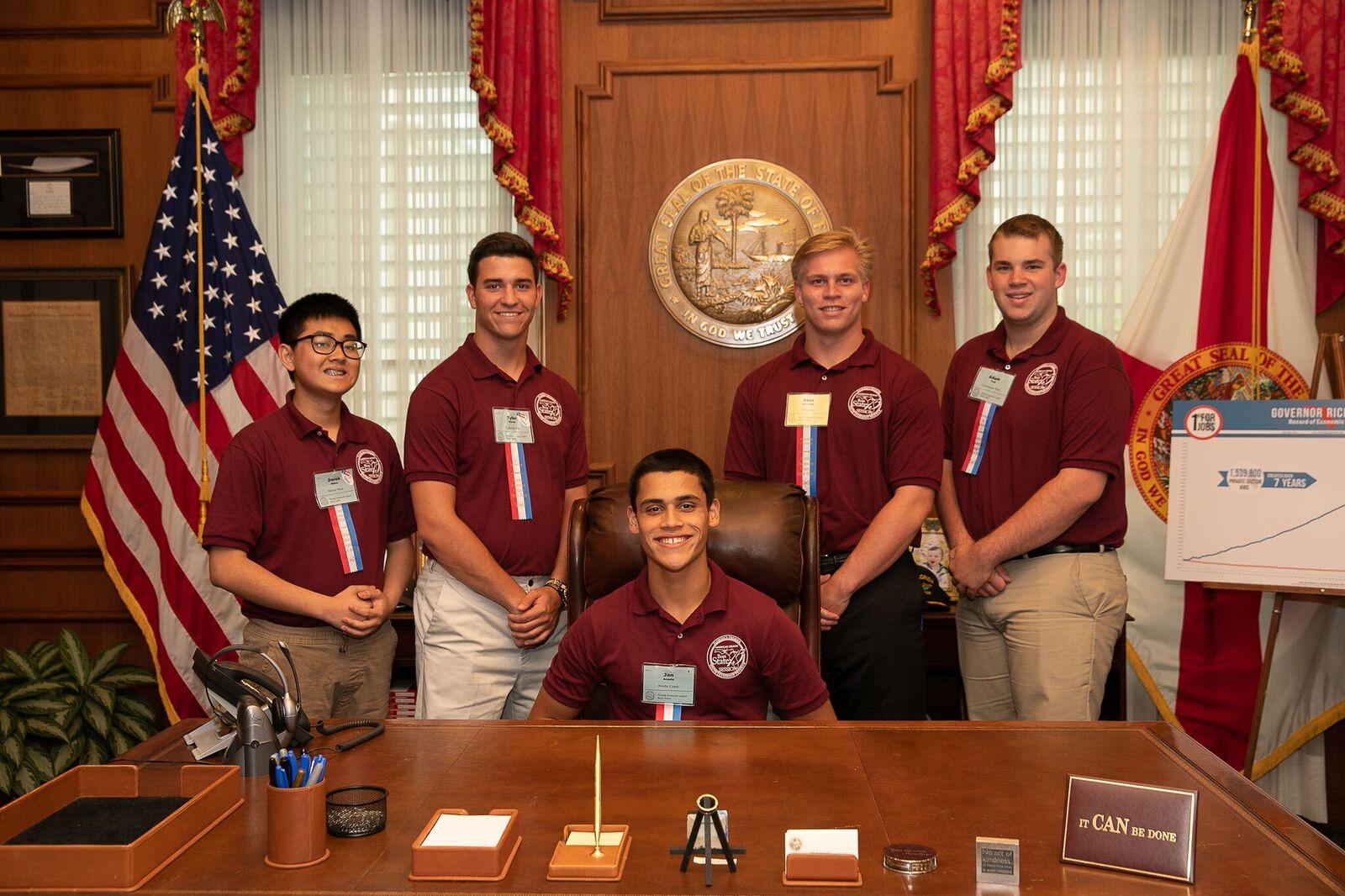
2. Each County will nominate ONE citizen they wish to represent their party by a majority vote.
3. The entire Party will decide between the nominated candidates by a majority vote.
4. The entire State will vote between the TWO nominated candidates by a majority vote.
The Governor is the head of the Executive Branch and head of Boys State. He greets and extends official courtesies to honored and distinguished guests of the State. In his capacity as Chief Executive, he cooperates fully with the Staff and is responsible for the well-being and proper functioning of the State. As part of his specific duties, he approves or vetoes bills passed by the Legislature, may grant pardons and suspend fines, and serves as chairman of the state Cabinet as it meets to consider various proposals. The Governor makes various appointments to state agencies.
2. The Governor Nominee will select who he wishes to be his Lt. Governor as soon as he is nominated.
The Lt. Governor runs on a ticket at Boys State with the Governor and carries out duties that may be determined by the Governor. He shall act as Governor in case the office should be vacated. The Lt. Governor is not a member of the Cabinet.
2.Each County will nominate ONE citizen they wish to represent their party by a majority vote.
3. The entire Party will decide between the nominated candidates by a majority vote.
4. The entire State will vote between the TWO nominated candidates by a majority vote.
The Attorney General is the state's chief legal officer. He is a member of all major state boards, acts as advisor to the Governor and to the Boys State Staff in connection with routine matters of discipline not brought before the courts. He represents Boys State in all suits or legal actions to which Boys State is a party. The Attorney General candidates must pass the Bar Exam. The Attorney General candidates for each party will argue at least one case before the Supreme Court. He sits as a member of the Cabinet.
The Chief Financial Officer of the state settles and approves accounts against the state. He decides what state bills to pay. He advises county officers in matters of finance and taxation. He is a member of all major cabinet boards. He is the custodian of all funds and general equipment belonging to Boys State. He also acts as State Insurance Commissioner and as State Fire Marshal. He sits as a member of the Cabinet.
The Commissioner of Agriculture oversees public lands and agriculture in the state, as well as consumer affairs. He sits as a member of the Cabinet.
Citizens will be appointed to the Small Cabinet by the newly elected Governor.
(Note: Citizens can be of any party.)
JUDICIAL BRANCH
The Judicial Branch is the guardian of the Scales of Justice. If any citizen feels that he did not get a fair trial in the County Court, he may appeal it to the Supreme Court.
The Supreme Court consists of seven Justices.
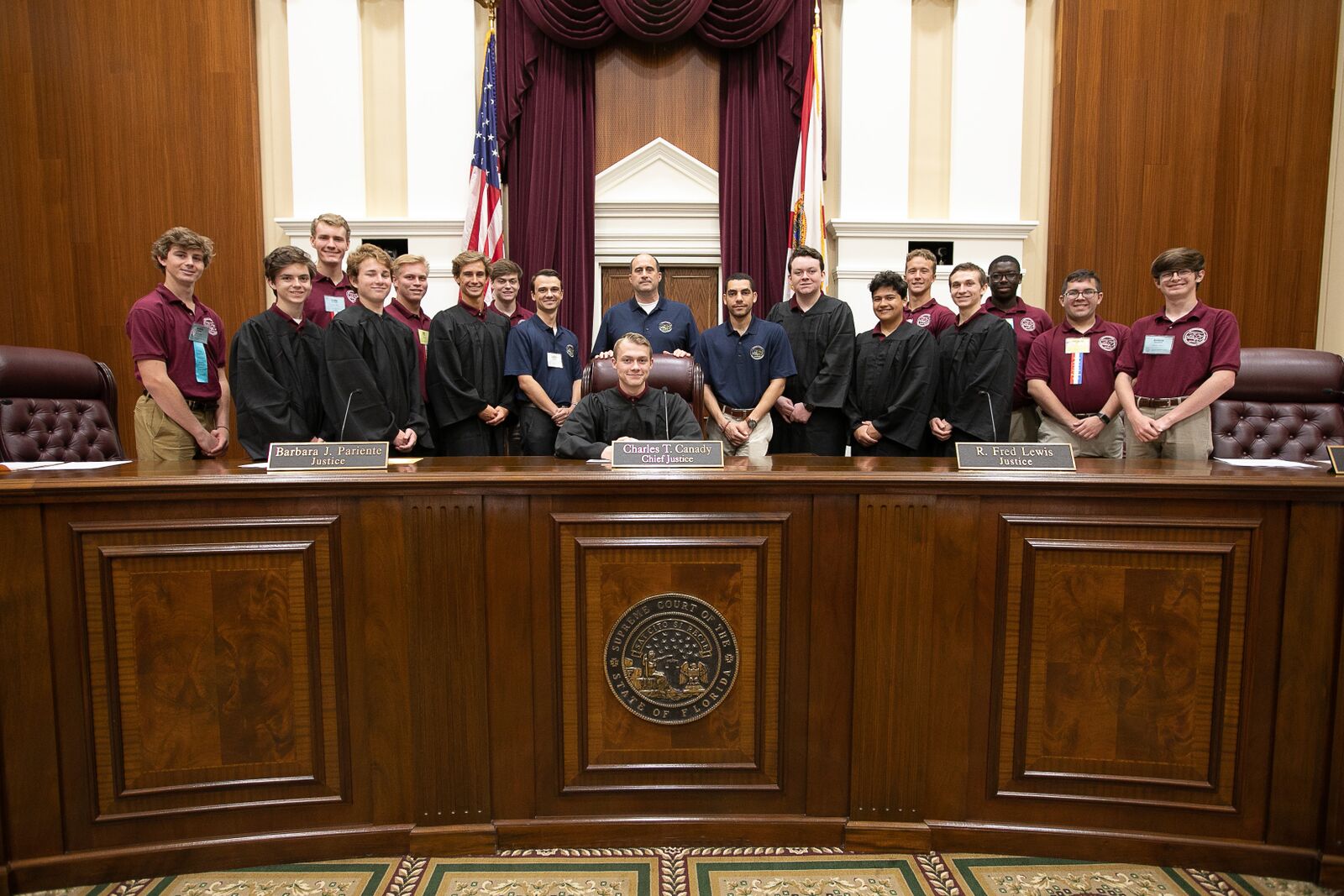
2. Any citizen wishing to be on the Supreme Court must fill out the Supreme Court Application To The County JNC form. They will bring this form with them to the JNC interview.
3. Each JNC / County Commission will review and submit two individuals from their County for potential selection by the Governor.
4. The Governor must select one person out of the two nominees submitted by each JNC.
(Note: The Governor is not permitted to appoint someone to the Supreme Court who was not submitted by a JNC. Likewise, the Governor is not permitted to appoint both people submitted by one JNC.)
The Seven Justices shall decide amongst themselves who will be The Chief Justice.
The Chief Justice shall preserve order and decorum in the courtroom. He shall have general control of the courtroom and the power to clear the courtroom of spectators in the case of a disturbance. The Chief Justice shall preside over all meetings of Justices when deliberating over the decision in a case. The Chief Justice shall assign a Justice who has voted with the majority to write the written opinion.
The Governor shall appoint the Marshall and Chief Clerk.
The Marshall will start each court session by rising from his seat and stating:
"All rise. Hear Ye, Hear Ye, Hear Ye. The Supreme Court of the great state of the Florida American Boys State is now in session. All who have causes to plea draw near, give attention, and you shall be heard. God save these United States, the great state of Florida, and this honorable Court."
Press CorpS
Along with the three traditional branches of government, there exists a “fourth” arm of public policy - namely, the media.
These members of the media will work for the statewide daily newspaper, daily news shows or the yearbook.
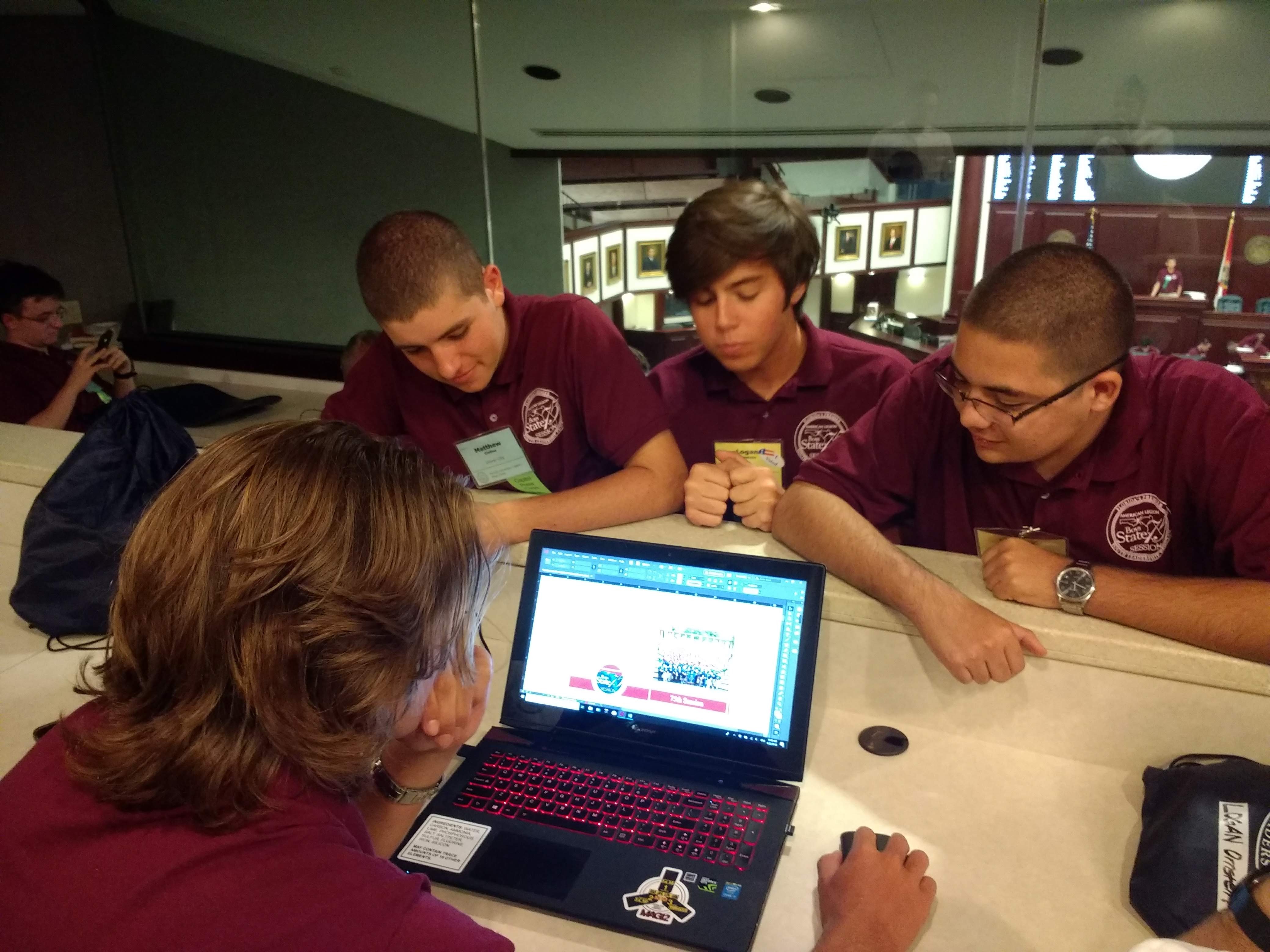
Any citizen who joins the Press Corps may not run for ANY other appointed or elected position.
• Correspondents
• Photographer
• Staff Writers
• News Director
• News Anchor
• Reporters
• Cameramen
• Video Editor
• Editor-in-Chief
• Layout / Design Editors
• Photographers
CHAPLAIN
The Chaplain will serve as Chaplain of the Senate and the Assistant Chaplain will serve as Chaplain of the House.
They will serve Boys State together in their regular duties concerning the spiritual guidance of Boys State, and may not hold any other appointed or elected position at any level.
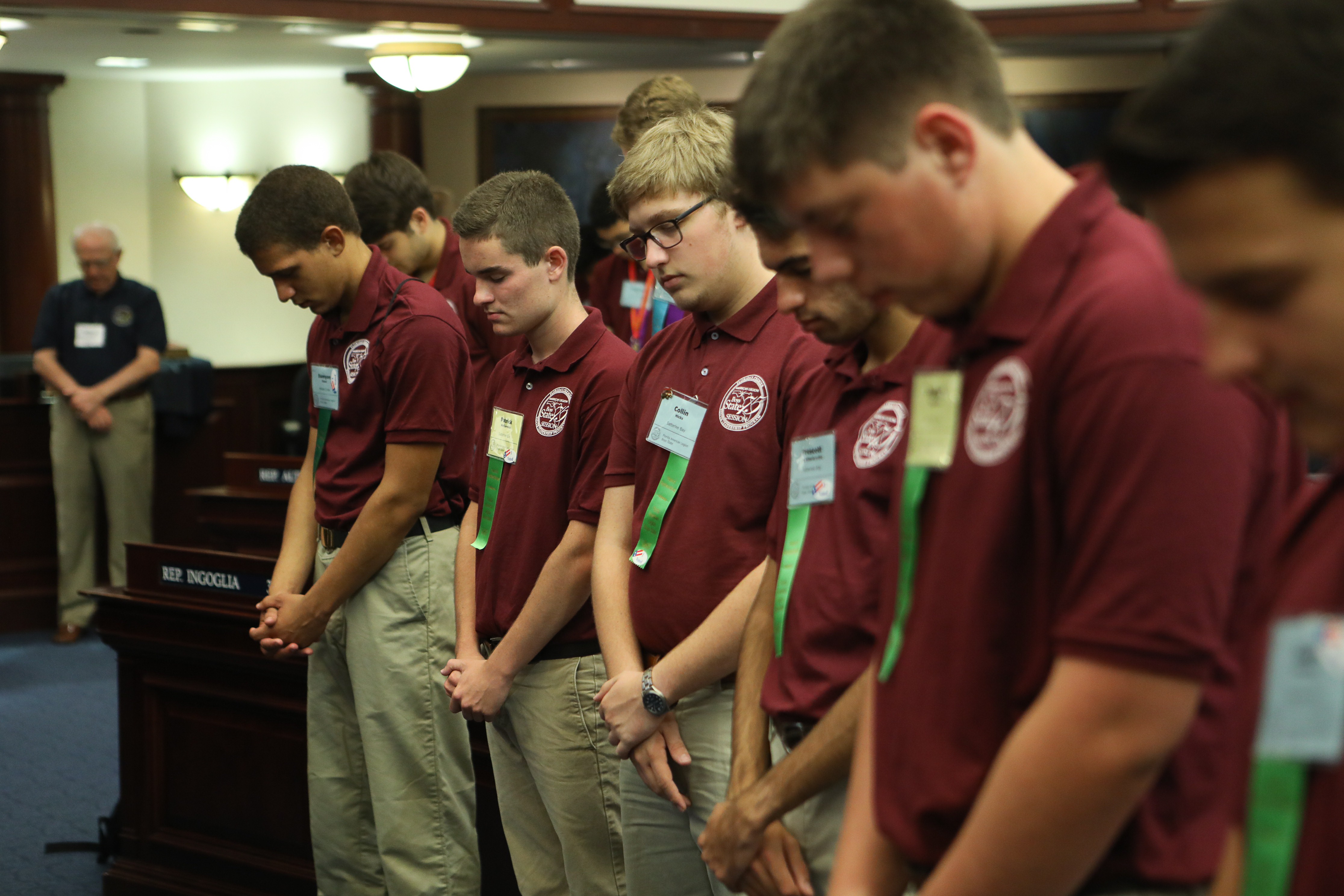
2. A special committee consisting of Boys State Staff will decide a Chaplain and Assistant Chaplain.
(Note: The Chaplain may NOT hold ANY other appointed or elected position.)